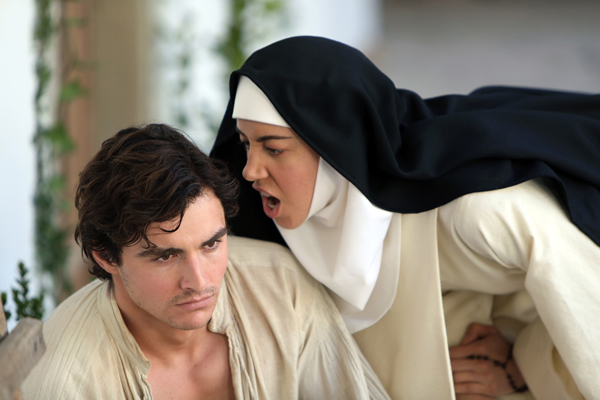It’s summer 2017. For a breath of fresh air away from the news, and the barrel laughs we all duly deserve, check out the ensemble comedy The Little Hours. Written and directed by Jeff Baena (Joshy) and featuring his offscreen partner, Aubrey Plaza (who starred in Baena’s Life After Beth), the film boasts a star-studded cast of contemporary comedic icons. Baena takes a relatively simple plot and, through the kinetic performances of his troupe, crafts one of the funniest comedies of its kind in a long time.
Set in a convent in medieval Italy, Allison Brie (Netflix’s GLOW) plays Alesandra, whose father’s business is having trouble and therefore cannot afford her suitor’s demand for a dowry. This means Alesandra, who has been brought up in the convent, may be stuck in the service of the Lord for the rest of her life. All the girls in the nunnery are more or less stuck in the same boat; their families have left them there as signs of good faith. (Having a son or daughter of the cloth is a status symbol.)
The young nuns are textbook examples of pent-up aggression. Alesandra, although the most mannerly of the nuns, is growing frustrated as the clock ticks away on her youth. Fernanda (Plaza) deals with her angst in the other direction, lashing out violently at the groundskeeper and sneaking out at night to party with her libidinous friend Marta (Jemima Kirke of HBO’s Girls). Then there is poor Genevra (Kate Micucci, of the comedy/folk duo Garfunkel and Oates), the shy one who just wants to fit in with the cool nuns.
The sisters’ wills are tested when Father Tommasso (the ever-lovable John C. Reilly) brings Massetto (Dave Franco), a new caretaker, to the convent. Only Father Tommasso knows that Massetto is on the run from his former master, Lord Bruno (Nick Offerman), after having relations with his wife (Lauren Weedman from HBO’s Looking). To keep Massetto safe, the priest devises the plan to have the fugitive pretend to be deaf and dumb while taking care of the convent grounds. He wants another male around and makes Massetto his drinking buddy as the two get intoxicated together on the sacramental wine every night.
Massetto is meant to be that kind of young stud that no woman can keep her hands off of. Even without speaking and deliberately trying to keep the nuns at arm’s length, his efforts make the women want him even more. The middle act is basically scene after scene of the young nuns sexually assaulting Massetto, who can’t help but give in to the freakiness of these repressed, horny women.
One of the film’s tricks is that, for the most part, it uses contemporary English for the medieval setting. That’s actually an understatement. One of the points of hilarity is watching nuns in full restrictive religious clothing covering everything but their faces swear like seasoned sailors. The fact that the script is based loosely on Giovanni Boccaccio’s The Decameron begs to wonder how many literary classics could benefit from the same modernizing technique (I’ve always wanted to see Crime and Punishment done as a screwball comedy). Just because a film is set in a historical period does not necessarily mean we have to listen to the strictest re-creation of the time period’s language.
Throw in some lesbianism, witchcraft, and supporting performances by Fred Armisen, Adam Pally, and Molly Shannon and you have one of the year’s funniest films. I kept comparing it to Mel Brooks’s History of the World: Part I. But after Armisen’s stuffy bishop character shows up, it becomes clear this convent is the worst one ever and the more apt comparison would be to Police Academy. The Little Hours proves a female-centric comedy can be just as raunchy and deeply sensual as anything that’s come before.

















Leave A Comment